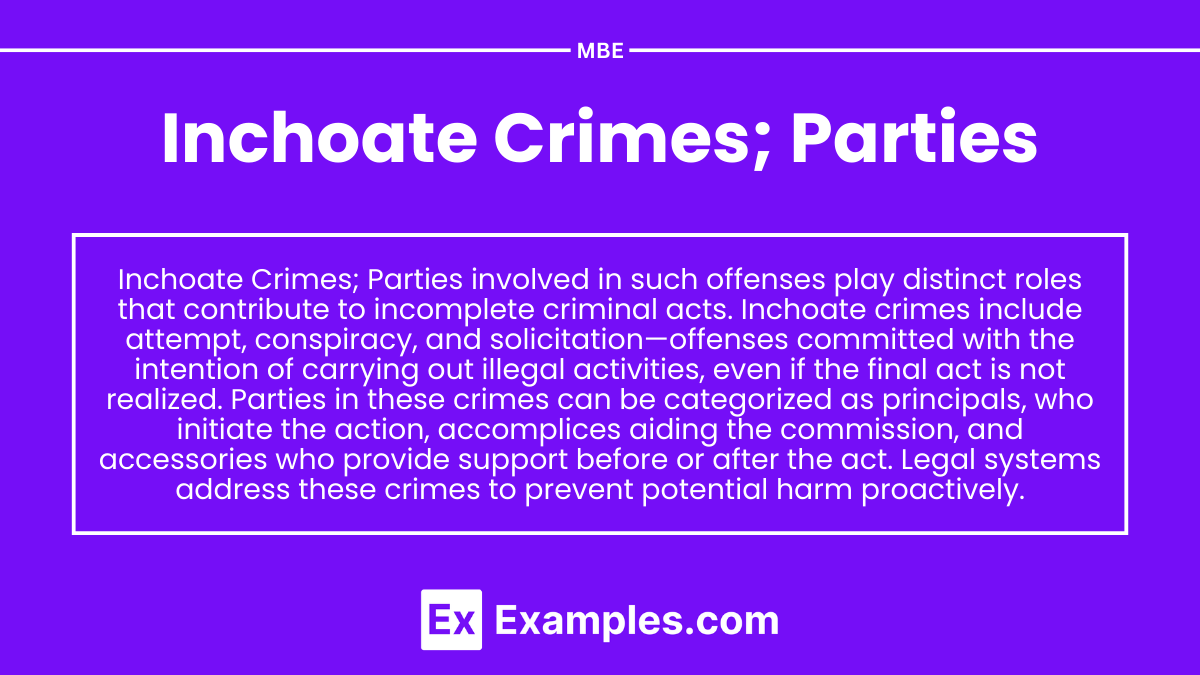Preparing for the MBE Exam requires a solid grasp of “Inchoate Crimes; Parties,” encompassing the theoretical and practical aspects of criminal law. This includes understanding the elements of attempt, solicitation, and conspiracy, as well as the legal distinctions between principals, accomplices, and accessories. Proficiency in analyzing the intent requirements, overt acts, and the scope of liability for parties involved in criminal conduct is crucial. Additionally, mastering defenses like abandonment or withdrawal and their applicability under various statutes will enhance your ability to navigate complex legal scenarios effectively.
Learning Objectives
In studying Inchoate Crimes and Parties for the MBE Exam, you should learn to understand their foundational role in criminal law and their application to complex scenarios. Inchoate crimes include attempt, solicitation, and conspiracy, each requiring specific intent and overt acts to establish liability. Understanding doctrines like withdrawal, abandonment, and the scope of conspiratorial agreements is essential. For parties, concepts such as principals, accomplices, and accessories before and after the fact are crucial for analyzing liability and the degree of involvement.
Inchoate Crimes
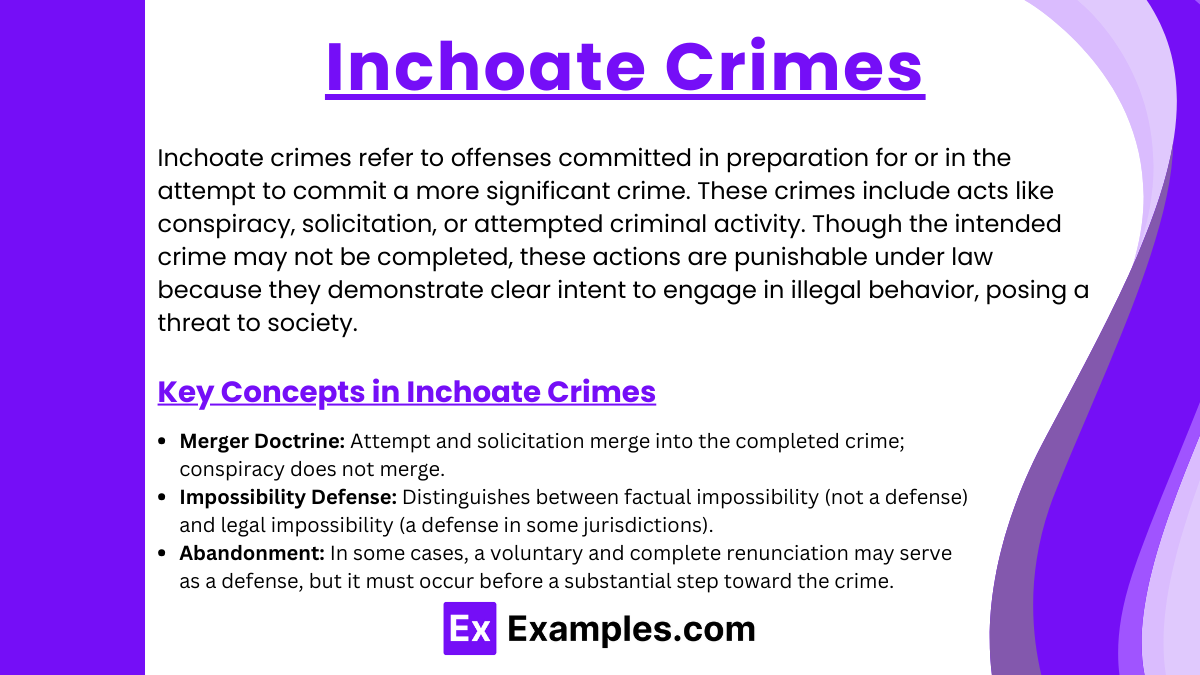
Inchoate crimes refer to offenses committed in preparation for or in the attempt to commit a more significant crime. These crimes include acts like conspiracy, solicitation, or attempted criminal activity. Though the intended crime may not be completed, these actions are punishable under law because they demonstrate clear intent to engage in illegal behavior, posing a threat to society.
Key Concepts in Inchoate Crimes
- Merger Doctrine: Attempt and solicitation merge into the completed crime; conspiracy does not merge.
- Impossibility Defense: Distinguishes between factual impossibility (not a defense) and legal impossibility (a defense in some jurisdictions).
- Abandonment: In some cases, a voluntary and complete renunciation may serve as a defense, but it must occur before a substantial step toward the crime.
Types of Inchoate Crimes
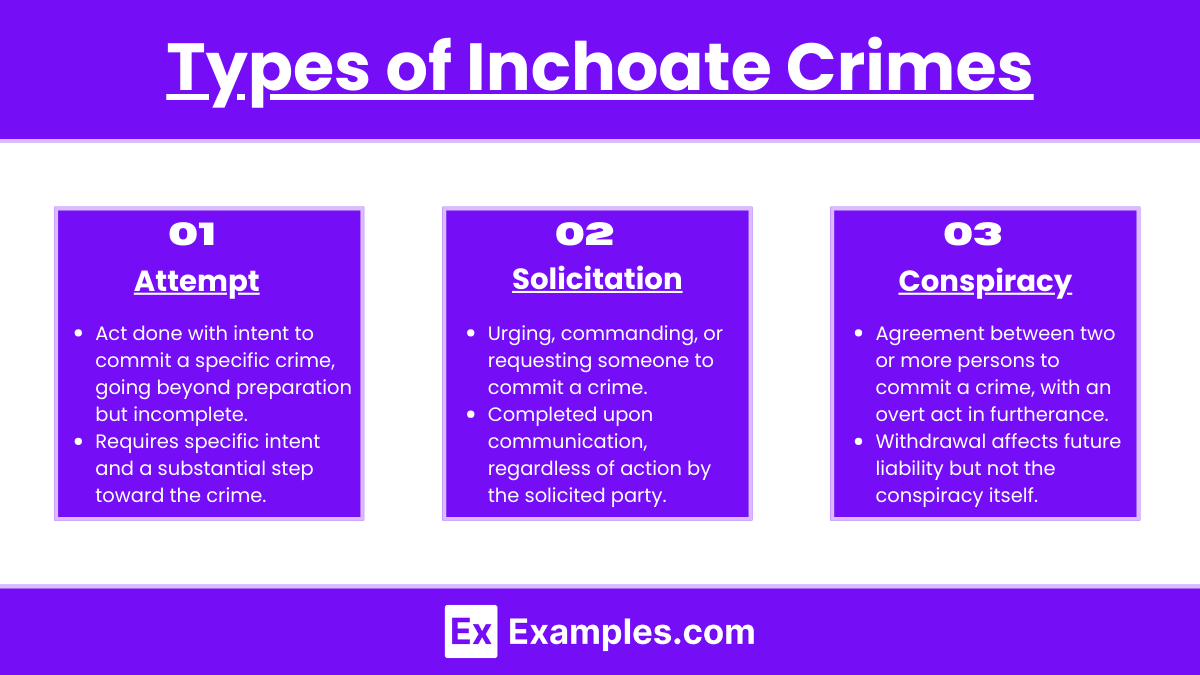
- Attempt
- An act done with intent to commit a specific crime that goes beyond mere preparation but falls short of completion.
- Key elements include specific intent and a substantial step toward the commission of the offense.
- Solicitation
- Involves urging, commanding, or requesting another person to commit a crime.
- The crime of solicitation is complete upon the communication of the request, regardless of whether the solicited party acts on it.
- Conspiracy
- An agreement between two or more persons to commit a crime, accompanied by an overt act in furtherance of the agreement.
- Requires specific intent to agree and specific intent to achieve the criminal objective.
- Withdrawal from conspiracy may negate liability for future crimes but not for the conspiracy itself.
Parties to a Crime
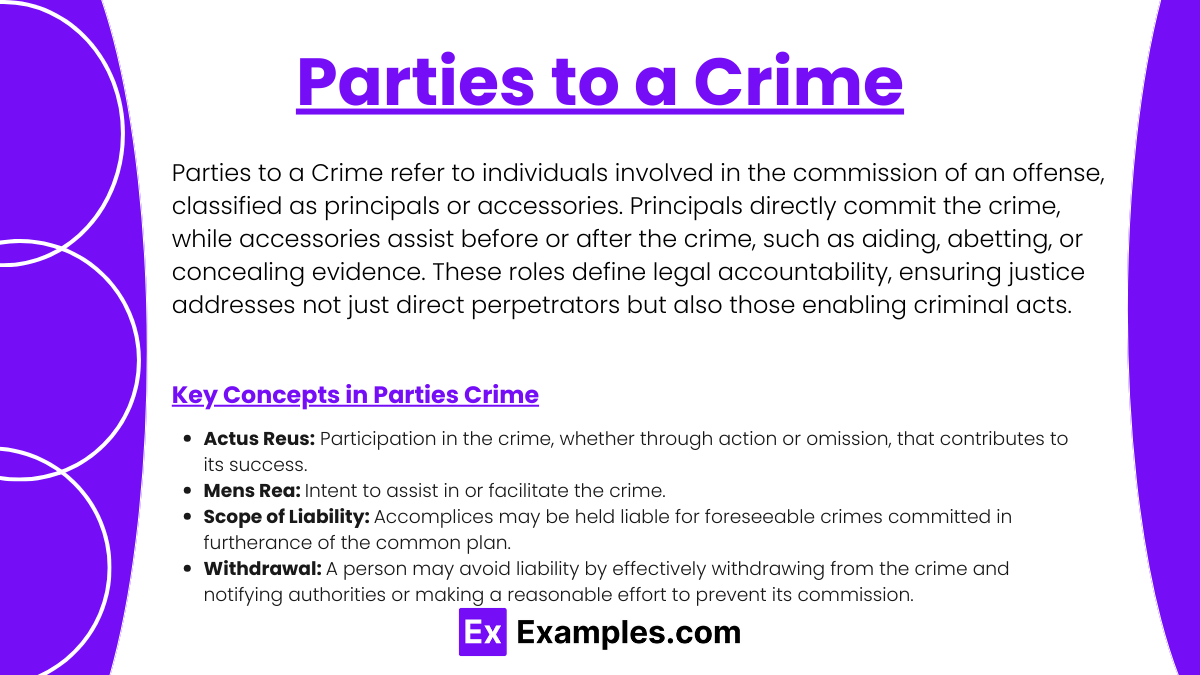
Parties to a Crime refer to individuals involved in the commission of an offense, classified as principals or accessories. Principals directly commit the crime, while accessories assist before or after the crime, such as aiding, abetting, or concealing evidence. These roles define legal accountability, ensuring justice addresses not just direct perpetrators but also those enabling criminal acts.
Key Concepts in Parties Crime
- Actus Reus: Participation in the crime, whether through action or omission, that contributes to its success.
- Mens Rea: Intent to assist in or facilitate the crime.
- Scope of Liability: Accomplices may be held liable for foreseeable crimes committed in furtherance of the common plan.
- Withdrawal: A person may avoid liability by effectively withdrawing from the crime and notifying authorities or making a reasonable effort to prevent its commission.
Types of Parties
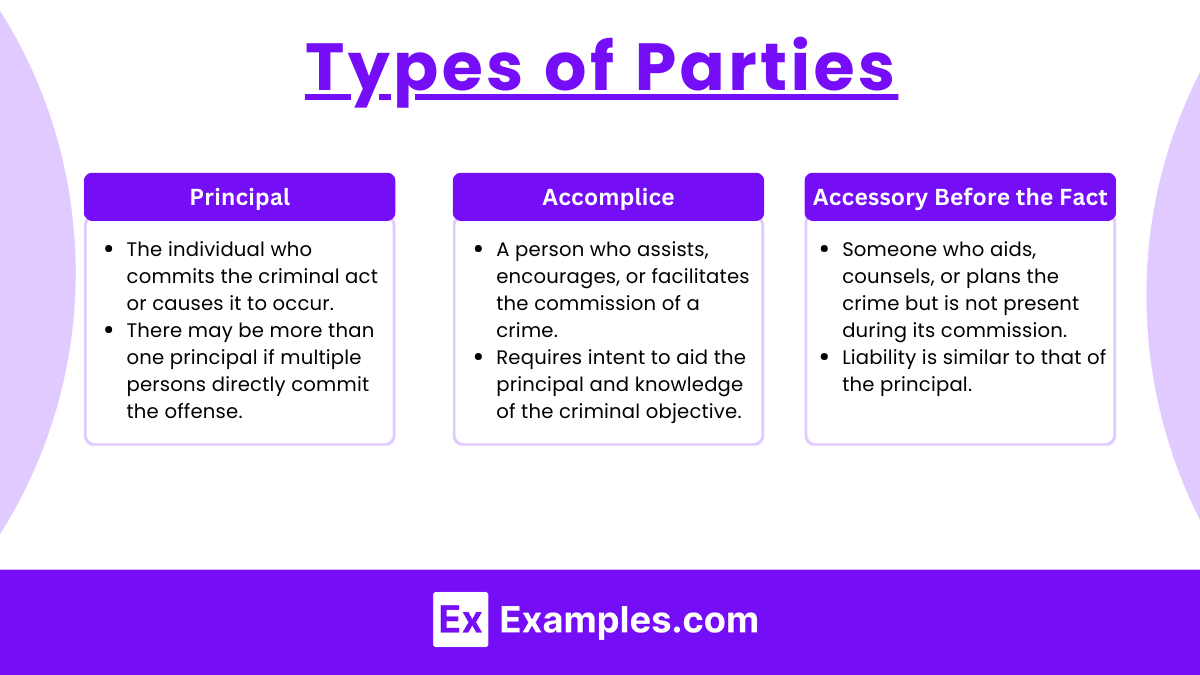
- Principal
- The individual who commits the criminal act or causes it to occur.
- There may be more than one principal if multiple persons directly commit the offense.
- Accomplice
- A person who assists, encourages, or facilitates the commission of a crime.
- Requires intent to aid the principal and knowledge of the criminal objective.
- Accessory Before the Fact
- Someone who aids, counsels, or plans the crime but is not present during its commission.
- Liability is similar to that of the principal.
Examples
Example 1. Conspiracy to Commit Robbery
A group of individuals plans a bank robbery, detailing their roles and the timing of the act. Even if the robbery is never carried out, they can be charged with conspiracy, an inchoate crime. Each member is considered a party to the crime because their agreement and preparation demonstrate intent, making them equally culpable under the law.
Example 2. Attempted Arson
A person is caught with gasoline and matches outside a commercial building. Despite the fire never starting, their actions indicate an intent to commit arson. Attempt, as an inchoate crime, holds the individual accountable for taking substantial steps toward committing the offense, classifying them as a party to the crime.
Example 3. Solicitation for Murder
An individual hires a hitman to kill a business rival, but law enforcement intercepts the plot before any harm is done. Solicitation, an inchoate crime, criminalizes the act of inciting another to commit an offense. Both the solicitor and the solicited party can face legal consequences even if the crime remains unfulfilled.
Example 4. Aiding and Abetting Drug Distribution
A person provides transportation and financial resources to assist in drug trafficking operations. Although they do not handle the drugs directly, their involvement as an aider or abettor makes them a party to the crime. This demonstrates how accessory roles are encompassed within the framework of inchoate offenses.
Example 5. Planning a Cyberattack
A hacker designs malicious software and collaborates with others to launch an attack on a government system. Even if the cyberattack is thwarted, the preparatory acts and agreement classify the individuals as parties to a conspiracy, emphasizing the proactive enforcement of laws against inchoate crimes.
Practice Questions
Question 1
Which of the following is NOT an example of an inchoate crime?
A) Attempt
B) Conspiracy
C) Aiding and Abetting
D) Solicitation
Answer: C) Aiding and Abetting
Explanation: Inchoate crimes are offenses that involve steps toward committing another crime but do not result in the completion of that crime. Examples include attempt, conspiracy, and solicitation.
- Attempt: An act done with the intent to commit a crime but that falls short of completion.
- Conspiracy: An agreement between two or more people to commit a crime.
- Solicitation: Encouraging or persuading another person to commit a crime.
Aiding and abetting refers to assisting or encouraging a principal in the commission of a completed crime, not an inchoate offense, as it occurs during or after the crime has been carried out.
Question 2
Which of the following is a key element of the crime of conspiracy?
A) The commission of the underlying crime.
B) The involvement of at least three people.
C) An agreement between two or more people to commit a crime.
D) Evidence of remorse or withdrawal from the agreement.
Answer: C) An agreement between two or more people to commit a crime.
Explanation: The crime of conspiracy does not require the underlying crime to be completed. Instead, the essential elements are:
- An agreement between two or more people to commit an unlawful act, and
- In some jurisdictions, an overt act taken by one of the conspirators in furtherance of the agreement.
It does not require three or more participants, and withdrawal or remorse is not a defense unless certain legal conditions are met, such as timely renunciation and preventing the crime.
Question 3
A person who helps plan a robbery but does not participate in the actual robbery itself is considered:
A) A principal.
B) An accomplice.
C) An accessory before the fact.
D) Not guilty of any crime.
Answer: C) An accessory before the fact.
Explanation: Parties to a crime are categorized based on their role in the offense:
- Principal: The person who directly commits the crime.
- Accomplice: A person who actively assists or facilitates the crime during its commission.
- Accessory before the fact: A person who helps prepare or plan the crime but is not present during its commission.
- Accessory after the fact: A person who helps the offender avoid detection or punishment after the crime.

